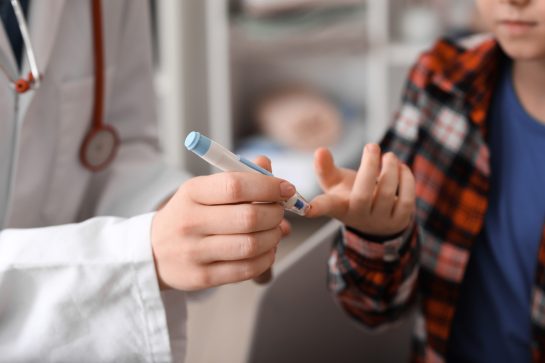Diabetes is one of the most common causes of death in the US. Approximately 1 in 3 Americans currently has prediabetes, yet over 80% of these people don’t even know that they have it. Unfortunately, communities already experiencing hardships are most at risk for diabetes. Utilizing social programs to better screen for the disease may significantly improve the living conditions of the populations these initiatives serve.
WORLD DIABETES DAY
For the past 29 years, November 14 marks World Diabetes Day, hallmarking an international effort to bring awareness to a critical health condition—one that more than 463 million people worldwide live with1. It lands on the birthday of Sir Frederick Banting, who discovered insulin (the life-saving treatment for diabetic individuals) with Charles Best, almost one hundred years ago.
Despite the availability of a diabetes treatment for nearly a century, there is still much risk surrounding this common condition. It is currently the seventh leading cause of death in the United States2, and cases of type 1 and type 2 diabetes are on the climb. As of 2020, over 34.2 million Americans have diabetes (about 1 in 10) and 88 million Americans have prediabetes (approximately 1 in 3)3.
Diagnosis is just the start to the difficulties of diabetes. Those with this condition are more likely to experience a variety of cancers (including liver, pancreatic, uterine, colon, breast, and bladder)4, loss of vision, kidney dysfunction, limb and toe amputation, and the loss of life5. Not only are the physical consequences extremely serious, but diabetic patients also pay (on average) 2.3 times more in medical costs than a non-diabetic person. Diabetes is an incredible hardship for inflicted patients and a significant burden on the US healthcare system.
WHY IS THIS THE CASE?
Even though diabetes and prediabetes are so common, over 80% of Americans who have the condition do not know that they have it6. Most experts point to a lack of awareness and understanding of the condition. While true, this explanation may fail to capture the full scope of compounding issues leading to both diabetes development and lack of diagnosis: social determinants of health.
In recent years, several social determinants of health (SDoH) have been linked to the development of diabetes. Underserved ethnic minorities—particularly Black, Hispanic, and Indigenous communities—are significantly more at risk for diabetes than their white counterparts7. Additionally, those in lower socioeconomic positions, those with lower levels of education, and those who do not or cannot attend regular health check-ups develop much higher instances of diabetes8. It is easy to see why—these factors regularly correlate with a lack of access to resources like healthcare, proper nutrition, and time for regular exercise.
Until these issues are addressed, it seems unlikely that any significant change in diabetes cases will occur. However, when community-led initiatives work cooperatively to address SDoH alongside diabetes treatment, these programs can achieve real and lasting impact.
HOW YOU CAN HELP FIGHT DIABETES
Non-profits, government initiatives, and other social programs all offer a great starting place to bring awareness to diabetes. Many of these programs serve populations that experience SDoH challenges or deficiencies, and statistically as many as one in two clients may be at risk of or experiencing prediabetes. While this number is troubling, it also suggests that simple awareness campaigns can have profound effects on improving the health and safety of those they serve.
Specifically, the CDC recommends three ways that programs can begin building awareness for diabetes and help stop the condition from developing beyond its early stages9:
- Encourage clients to find out if they’re at risk.
Simple and free risk tests are available online at sites like the CDC. This is particularly useful for clients experiencing one or more of the compounding SDoH risks (such as lower socioeconomic status or lower education). Case management tools like Eccovia’s ClientTrack are great tools that facilitate identifying and monitoring those most at risk. - Tackle risk factors head-on.
One program alone cannot handle all the work required to help communities work toward a diabetes-free world. Instead, focus collaborative and community efforts towards a unified approach to whole person care. - Diagnose early for prompt treatment.
Prediabetes is reversible; the earlier programs can identify and diagnose diabetes in patients, the sooner these people can begin working to change their circumstance. This is why awareness on diabetes is so crucial—it could literally mean life or death.
While these steps will not end the diabetes crisis overnight, they can offer a solid place to start. Working to not only resolve diabetes but also the SDoH that underly its diagnosis, is key to creating lasting changes that will impact generations to come.
WORKS REFERENCED
- https://worlddiabetesday.org/activities/
- https://www.cdc.gov/diabetes/pdfs/library/Diabetes-Report-Card-2019-508.pdf
- https://www.cdc.gov/diabetes/pdfs/library/Diabetes-Report-Card-2019-508.pdf
- https://academic.oup.com/hsw/article-abstract/26/1/26/756299?redirectedFrom=PDF
- https://www.cdc.gov/diabetes/prevention/index.html
- https://www.cdc.gov/diabetes/pdfs/library/Diabetes-Report-Card-2019-508.pdf
- https://www.cdc.gov/diabetes/pdfs/library/Diabetes-Report-Card-2019-508.pdf
- https://worlddiabetesday.org/activities/



